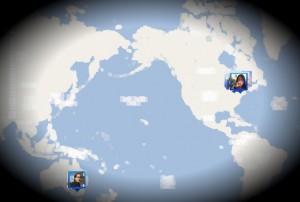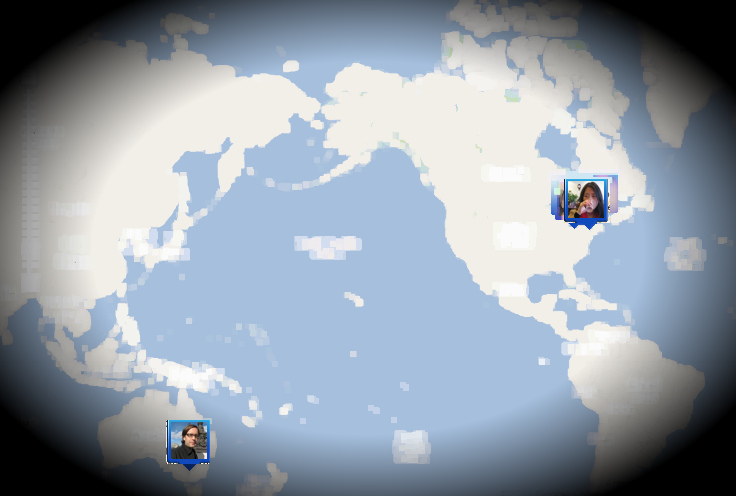
I don’t use the word radical all that lightly, so I am not just fishing for blog referrals.
The Background
I am working on a possible paper/pedagogical approach with a Finnish colleague, Pekka Ihanainen, and he had referred me to an article on the New Aesthetic, more of a report really from a panel at the SXSW Conference. However, what it put forth as the tenets/facets of the New Aesthetic movement had me head spinning with potential applications/ illumination for what I have been struggling with for a while in terms of learning pedagogy. They feel incomplete, a slice of a larger reality, stunted. They are all valid in their own right, in how they limit the conversations and possible permutations to particular environments and agents. This is perfectly acceptable and sound.
However, as we move from the classroom to the computer to the mobile to the perpetual learning environment of life as a pedagogical container, I don’t feel as though these slices cut it. We are looking for something more holistic, something that encapsulates the following
- multiple activities
- multiple spaces
- multiple connections
- multiple time references and overlapping constructs
This is what Pekka and I are working on and this is what some of the New Aesthetic article inspired me to address.
The Bold Assertion
First, the bold assertion.
We, as ‘mature’ civilizations embarking on new knowledge frontiers, have entered/are entering the next phase of learning. I am not talking about a post-industrial phase of education (although certainly that needs to change as well). I am not even talking about the shift of learning towards meta-skills/meta-learning (learning how to learn). Although this needs to happen sooner rather than later. I am talking about a radical shift away from linearity, from stability and towards moving targets and ephemeral knowledge constructs. I am talking about an embrace of simultaneity, of perpetual and distributed learning activity. And all of this taking place in this new reclaimed learning and sensory space just beneath overt consciousness (and above subconsciousness). Call it pixie dust if you want, but it is the sort of space that feels like reflex, but isn’t. It is a sharpening of the senses, without drawing from cognitive capacity. It is a shifting of the weight towards the back heel to free up the front space for novel activity. A tightening of the eyelids, a concerted gaze, yet a pliable one (as it is multitasking).
In short, we are becoming accustomed to simultaneous, somewhat cognitively taxing, activity. I know we as a human race always have been. But we have just reached a comfort zone with it, a zone so comfortable that I think it is time to ditch the metaphors that have served us to date when dealing with novel complexity.
The Metaphor
Beatrice leading Virgil. This outward personification. A guide. A conscious and deliberate decision to consult, to accept consul. Beatrice as a personification of a billion manifestations. We are confused with complexity. We seek council. We often assume this counsel exists outside (us and our networks). It no longer does. We exist simultaneously in so many networks that it would be hard for anything exist outside it. We have engineered diversity into our learning environments (and it we haven’t, we should).

The New Reality (Is it New?)
So, this metaphor of outside guide/counsel has shifted as we analyzed and became aware of the complexity encircling us and responded by doubling down on meta-skills, skills that would allow us to learn and navigate this morass. We forsook ‘stable’ notions of knowledge for the ability to create ephemeral, contextually valid constructs of knowledge for ourselves. We took metaphor and stopped looking for a way through it, as if through hell. We took it and made a coat out of it and no we wear it to insulate us.
So, we see this complexity, this simultaneity of learning taking place across time, space, networks. We see all of it shift towards a less conscious (but not sub-conscious) reality. Like a layer of skin to protect us from the sun. Maybe that is a bad metaphor. And why am I using metaphors still? Reflex, perhaps.
So, the starting position for learning has shifted somewhat. We look towards complexity of purpose, of activity, of simultaneity everywhere, as the norm. It is the de facto standard. From here, we can build again and even construct more metaphors to explain what progress looks like in this space.
But mark this as a point where we became aware that we were suddenly less aware (semi-conscious, if you will) of all that change and complexity. Mark it as a stage where fluid construction and discerning motion became the meta-skills of our time. That chaos will always exist in learning spaces (as it should to some degree), but that chaos won’t be the same chaos we referred to in the past.
